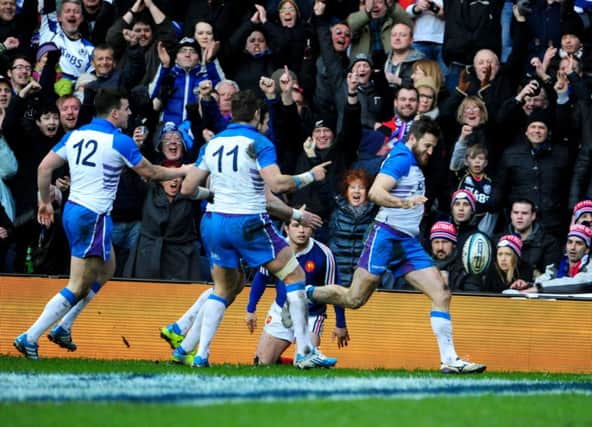Rory Lawson: Many positives in Scotland’s defeat


I know how tough it is to score against a French defence and now, like London buses, having waited for Scotland tries to come along we get two against Italy and another two against the French.
We have to look at both sides of the coin to understand how Scotland contrived to lose a game they dearly deserved to win. On the positive side, we had that creativity and ambition to take France on up front and attack them when it was on, and so from the scrum parity and lineout dominance we ended up with two good tries scored by Stuart Hogg and Tommy Seymour.
Advertisement
Hide AdAdvertisement
Hide AdEven after a poor start to the game by Scotland, the players regrouped and what pleased me particularly was that you could see the belief coursing through the team. They dusted themselves down after mishaps and got on with it, and each time the French picked up a penalty and scored some points Scotland took the initiative and put points on the board again.


But then we have the other side of the coin, which ulti- mately cost Scotland a victory their play merited. The goal kicks were not easy and the best one was probably Greig Laidlaw’s touchline conversion which many just expect him to kick these days. He was on his limit, into the Murrayfield breeze when he fell short and Duncan Weir similarly found the breeze to be influential when he fell short and a touch wide with his long-range effort in the second half.
The kicks goaled and missed were crucial to the outcome of the game because it meant that the French remained in the hunt. On the field you can feel it when you get four points ahead, or eight, or 15. These are key points in the mentality of players, and especially if, like France on Saturday, your game is now flowing. Staying within a score means you know that you can still win, so hope remains strong. Had we got to four points ahead with one of those penalties it would have dealt a psychological blow to a French side that never looked like scoring a try off their own play.
You add to the inability to kill off the game the fact that we kept giving them chances to nudge the scoreboard themselves with ill-discipline and it was a recipe for defeat. It is vital in Test matches, any match really with the ever-changing interpretations in law, that you understand what the referee wants quickly and adapt what you’re doing to please him.
There is always scope within that to play your game, but it is a matter of moving slightly towards what he wants or away from the areas that he is strict on. You have no choice and failure to adapt is rugby suicide. In saying that, it is not easy in the maelstrom of a Test match and I had sympathy for my former team-mates with Chris Pollock. I watched the Ireland v Italy game and every game that Nigel Owens referees is a good watch. Players love working with him because he has an empathy.
Pollock was so pernickety from the opening minute on Saturday and I had the feeling from early on that the penalty count would decide the game. Scotland coach Scott Johnson definitely had a point in his post-match interviews that a game of that nature should never have been 11 to two on penalty count after an hour, especially when the team dominating and leading is the one being hit with the penalty decisions. I cannot remember seeing that kind of ratio before.
But, ultimately, the players have to accept it and learn the lesson that for all they let themselves down on occasion and were harshly treated on others, they still had the opportunity to win the game and fell just short.
That will be occupying their minds this week, but they have to put it behind them because we are into the back-to-back games again and the tournament finale. Now is not the time to sit and analyse the negatives. That can be done in the post-Six Nations wash-up.
Advertisement
Hide AdAdvertisement
Hide AdNow is the time to grasp all the positives from the best performance of the championship so far. Take the belief from the victory against Italy with two tries and the fact that we dominated France, weakened perhaps and lacking in confidence themselves, but still France, a squad of tremendous quality and a nation that Scotland have beaten only four times in the last 20 years.
That is behind us now. Wales lie in wait and we have nothing to lose but to go to Cardiff, take them on up front in the same fashion as we did the Italians and French, and express ourselves in the backs. If we get that same aggressive forward platform, we have the players to cause Wales problems and there must be few better places in world rugby to claim victory than in the wonderfully passionate theatre of the Millennium Stadium.
That is the simple goal now and, putting Saturday’s disappointment behind them, this Scotland team are right to believe that they are capable of achieving it.